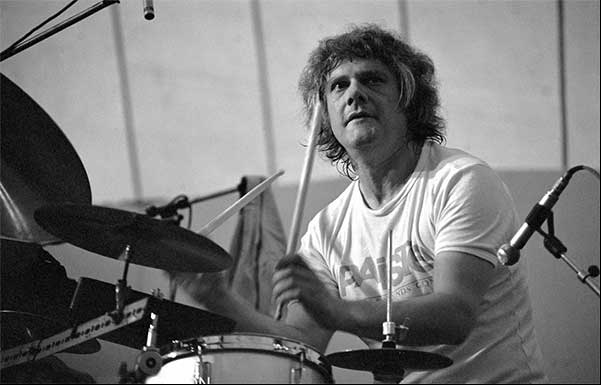
Tony Oxley, who has died aged 85, was perhaps the most important British drummer and percussionist working in the latter part of the twentieth century. He was born in Sheffield and took piano lessons as a child. He quickly gave up the piano, but, as a teenager, taught himself the drums. Drafted into the army in the late 1940s, he became an army musician, playing percussion. His military service took him to the US, where he heard a number of jazz greats live. In 1963, having been discharged from the army, he formed his first jazz group in Sheffield. Around that time he also met the guitarist Derek Bailey who, by an extraordinary coincidence, just happened to live round the corner from him.
Bailey and Oxley went on to form a trio – named, curiously, after the English composer Joseph Holbrooke – with the bassist-composer Gavin Bryars. Although they began by playing jazz standards, they morphed into a free improvisation group. Oxley was particularly interested in the more avant-garde side of jazz, Bryars, more in the classical music avant-garde. Bailey was interested in both. Between them, they evolved a musical style that was quite unknown in Britain or Europe at the time. Oxley said of it, “Sometimes there’s an assumption that this sort of thing is done just to be different. That’s totally wrong. It’s an emotional demand that you have to meet. When you’re wearing chains you don’t become aware of them through intellectual processes. You can feel them.” (1)
Nevertheless, Oxley retained an interest in mainstream jazz. In 1967, he moved to London and became the house drummer at Ronnie Scott’s. There, he got to play with the likes of Stan Getz, Sonny Rollins and Bill Evans. Playing with the Alan Skidmore Quintet at the Montreaux Jazz Festival in 1969, he picked up the award for best drummer. Not only that, but between 1969 and 1971, he consistently came out top in the Melody Maker readers’ poll for best drummer. He also played drums on John McLaughlin’s first album, Extrapolation. On the strength of this he was offered a recording contract with CBS. The two albums he made with them, The Baptised Traveller (1969) and Ichnos (1971), features Oxley alongside Evan Parker, Derek Bailey, and Kenny Wheeler. Jeff Clyne played bass on The Baptised Traveller, Barry Guy on Ichnos, on which Oxley was also joined by the trombonist Paul Rutherford. Although both albums are seen as classics of free improvised music, both, predictably,were commercial failures. CBS sacked him. Undeterred, Oxley, Bailey and Parker set up Incus Records, a label specialising in improvised music. It has often been described as the first musician-run record company in Britain. It was certainly the first to manage to keep going for any length of time. As well as being a musician, Oxley was an artist. Several Incus album-covers feature his work.
In the late 1960s, Oxley had begun experimenting with the modification of percussion sounds with electronics. This led to him incorporating a ring modulator and several other devices into his kit. He also brought in a number of found objects (screws, bowls, etc.) Although his kit became quite massive, he did talk of the importance of limiting choices in specific musical situations, rather than continually using the whole kit.
Oxley also involved himself in educational work. In 1970, he was artist-in-residence at Sydney Conservatorium in Australia and, in 1973, jazz instructor at the Barry Summer School in Wales.
In the 1980s, Oxley set up the ensemble, Celebration Orchestra, which issued three albums, Tomorrow is Here (1986) The Triple Cabinet of the Triad (1993) and The Enchanted Messenger (1995). He also toured with Anthony Braxton. In 1988, he met Cecil Taylor and quickly became the pianist’s drummer/percussionist of choice. He featured on several albums with Taylor, including Leaf Palm Hand (1989) and Looking (1990). In 2000, working with Norwegian musicians Ivar Grydeland (electric guitar) and Tonny Kluften (bass), he brought out the album Triangular Screen. His more recent work has not been so well-documented, although he did bring out an album with the percussionist Stephan Holker, The New World 165CD in 2023.
Tony Oxley was one of a handful of British musicians who played a major part in kickstarting the free improvisation scene in Britain. And although, as his collaborator Derek Bailey was keen to point out, free improvisation is a way of making music, not a style, he was one of the people who established what people expect free improvised music to sound like.
Tony Oxley, born Sheffield 15th June, 1938, died 26th December, 2023 aged 85, after a long illness.
Dominic Rivron
(1) Quoted in Improvisation It’s Nature and Practice in Music by Derek Bailey, Da Capo Press (1992)
LINKS
Rare recording of Joseph Holbrooke from 1965:
https://youtu.be/bZx4SCF-d6M?si=Ajb0mZ4ob03p4suN
An album of previously unreleased recordings made by Tony Oxley and Alan Davie at Davie’s home during 1977-78:
https://confrontrecordings.bandcamp.com/album/elaboration-of-particulars
Triangular Screen:
https://sofamusic.bandcamp.com/album/triangular-screen
A recent digital album of previously unreleased material, featuring artwork by Oxley:
https://discusmusic.bandcamp.com/album/unreleased-1974-2016-129cd-2022
More recent work with the percussionist Stefan Holker:
https://discusmusic.bandcamp.com/album/the-new-world-165cd-2023
Incus Records:
http://www.incusrecords.force9.co.uk/
Tony Oxley at Café Oto:
https://www.cafeoto.co.uk/artists/tony-oxley/
